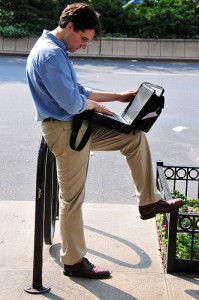Podcast: Play in new window | Download
Subscribe: Apple Podcasts | RSS
 In this episode, Chris and Jeff discuss engineers who find employment on a project-to-project basis, rather than signing on for a full time job.
In this episode, Chris and Jeff discuss engineers who find employment on a project-to-project basis, rather than signing on for a full time job.
- Our guest is Stephen Kesich, a recently graduated mechatronics engineer who is now residing in Southern California.
- Stephen reports that his classmates experienced difficulty finding full-time employment in their respective engineering fields.
- Knowledge of specific CAD software, such as CATIA or SolidWorks, is often important in landing a job in the field of mechanical design.
- Networking played a key role in helping Stephen find employment, as a friend’s father offered him an engineering job.
- Chris also found several of his engineering jobs through networking, despite his initial dislike for the concept.
- While a cooperative education program wasn’t in place at Stephen’s school, he managed to construct his own industrial connections.
- Stephen found LinkedIn to be an important avenue for making engineering connections.
- Finding housing for short-term projects is difficult, as month-to-month leases can be “massively” expensive.
- What Color is Your Parachute? is a classic job-search book that recommends many of the networking steps that Stephen has implemented on his own.
- Chris mentions a xkcd strip that provides a “cheat sheet” about which sports are in season.
- Non-disclosure agreements cover the intellectual property that contract employees access.
- Chris and Jeff haggle over the differences between contractors and consultants.
- Despite enjoying his contract work, Stephen looks forward to someday having a steady job.
- Daniel Pink wrote about free agent employment in his 2001 book, Free Agent Nation.
- Health insurance is generally not offered to contract employees.
- If you’re not a full-time employee, and work in the US as an independent contractor, you may receive a reporting of your earnings via a Form 1099.
- Jeff asks about the prevalence of Google-style interview questions.
- Chris likes to ask interviewees about their hobbies, believing a resume is best read from the bottom up.
- It’s often a difficult decision whether to remain a generalist, or become a specialist in your engineering field.
- Going through a site like Quirky is a new way to develop a product.
- Maintaining an online presence is likely to be of growing importance, as employers search for engineers who are already up-to-speed on a given subject.
- Chris is currently reading The Startup of You, by a co-founder of LinkedIn.
- Stephen can be reached through comments to this post.
Thanks to Ed Yourdon for the photo titled “Laptop Man.” Podcast theme music provided by Paul Stevenson